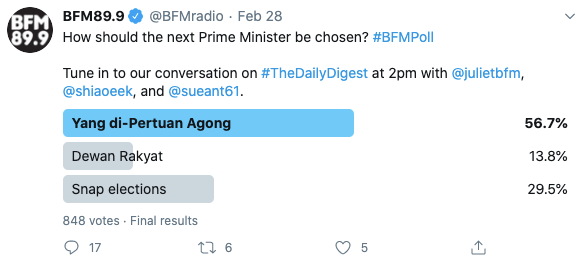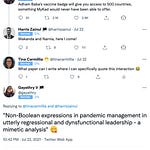Shady business, shifting business
The Atlantic launches Shadowland, an immersive series led by Ellen Cushing that explores the history, politics and sociology of conspiracy theories, albeit through an American-centric lens.
The WHO’s 73rd World Health Assembly adopts the resolution on the COVID-19 response. One highlight is the setting up an independent inquiry into “the actions of WHO and their timelines pertaining to the COVID-19 pandemic.”
The Guardian and everyone with a five-day working week fawn over Jacinda Ardern as she suggests New Zealand considers a four-day working week, further boosting her global popularity. Keyword: Global.
Newsrooms around the world, which have long been used to staggered shifts pre-COVID, are now further reconfiguring their operations with a “distributed newsroom” model. The most thorough resource on this is a playbook published by Fathm, an independent news lab – supported by Google News Initiative.
Court orders grandmother to delete social media photos of her grandchildren under GDPR, reports the BBC.
A brief history of the #BFMPoll
When we launched the live afternoon segment The Daily Digest on BFM, one of the worries was: Who listens to the radio during non-peak hours? One of my suggestions to address engagement issues was to carry out a daily Twitter poll. The call to action was to join the live discussion on-air. We started to get text messages (and the unicorn phone calls) during the show.
Twitter is its own bubble, and not everyone who participates in a poll actually listens to the show. Sometimes, 80 people vote on a poll, other times, 800. Sometimes, a poll takes the in-studio conversation on a different route. The poll creates continuity and cross-platform engagements, even after a segment ends. It creates liveliness.
After a few months of running daily polls for the show, the other BFM shows started to consistently do the same. Eventually, the digital team requested that all Twitter polls run with the hashtag #BFMPoll.
Soon, an independent UI/UX designer asked me if BFM uses historical data from these polls, for instance, to gauge the change of sentiment about the same topic from a few months or a year ago. We have kept in touch although I have since left BFM. Last month, he said the tool he is working on, which can provide such insight feature, is in the beta testing stage.
Not a bad story to tell about a puny afternoon show.
What I read, watch and listen to…
I’m reading Colin Marshall’s article on Open Culture about Graham Greene’s writing method, where he wrote 500 words per day and published 50+ books.
I’m bookmarking this long-read by Adam Garfinkle – a historian, political scientist, and former speechwriter for Colin Powell and Condoleezza Rice – about the erosion of deep literacy.
I’m watching Jessica Kellgren-Fozard’s Youtube channel. I discovered this British vlog recently and would recommend it to those who are interested in deaf and disability awareness (she is deaf and has other chronic illnesses) or otherwise, in 1950s vintage fashion (I’m not) or LGBTQ+ identity (I am). Her wife is a dentist and sometimes appears on her channel; she is half Malaysian, so I’m partial. Youtube algorithm works in mysterious ways, and while we sometimes complain about it, I’m not complaining about this one. Start here:
Chart of the week
In 2015, Buzzfeed’s Anna Borges created a series of humourous charts showing what being an introvert is like. Not quite sure if this is tasteful now:
Tentang Chairil
Penyair Chairil Anwar hidup dan bergiat tatkala Indonesia baru saja terbentuk, dan bersama pembentukan republik itu, turutlah dikembangkan dan disatukan identiti kebangsaannya, termasuklah bahasa.
Chairil seorang yang biadap bahasanya namun tetap puitis. Dia seorang plagiat dan berhutang wang tidak terbayar sehingga mati. Dia juga mati awal, belum cukup bulan menyambut ulang tahunnya ke-27.
Dan dia juga yang menjadi pembela dan pengangkat bahasa Indonesia yang pada ketika itu belum lagi disusun habis. Penggunaan bahasanya dalam penulisannya mendekatkan orang biasa dengan bahasa baharu ini, dengan kata-kata pinjaman dari bahasa daerah yang mungkin menyenangkan penerimaan bahasa Indonesia pada ketika itu. Kosa kata harian yang kasar yang tidak senonoh dibukukan malah ditulis mencemari kesucian kertas halaman. Tapi ia juga memudahkan sastera — yang mungkin dianggap elitis ketika itu, seperti sekarang juga — kepada semua.
Dalam prosanya Hoppla, Chairil juga menulis: “Kata ialah kebenaran!!!” Tapi dengan bahasa yang sama dia juga membuluhkannya, iaitu, walau bahasa itu benar dan kukuh, tapi tetap terlentur tidak terpatah. Dan Chairil dengan penuh mampu betul-betul melenturkan bahasa dengan sususan yang pintar malah estetik seninya.
Mungkin juga ia nostalgia semangat zaman harapan baharu 1940-an di Indonesia.
Dan mungkin kerana semua itu, mudah untuk kita membuat alasan tentang perbuatan buruknya, mudah untuk tidak mengendahkan kesilapannya, dan terus sujud bodek mengagungkan karyanya.
Mungkin Chairil Anwar memudahkan penerimaan perbezaan dalam kehidupan yang serba tidak sempurna.
Nota ini pada asalnya diterbitkan pada April 2020 di Facebook.














